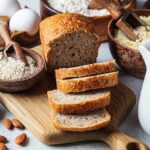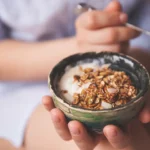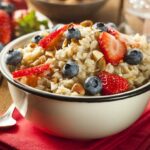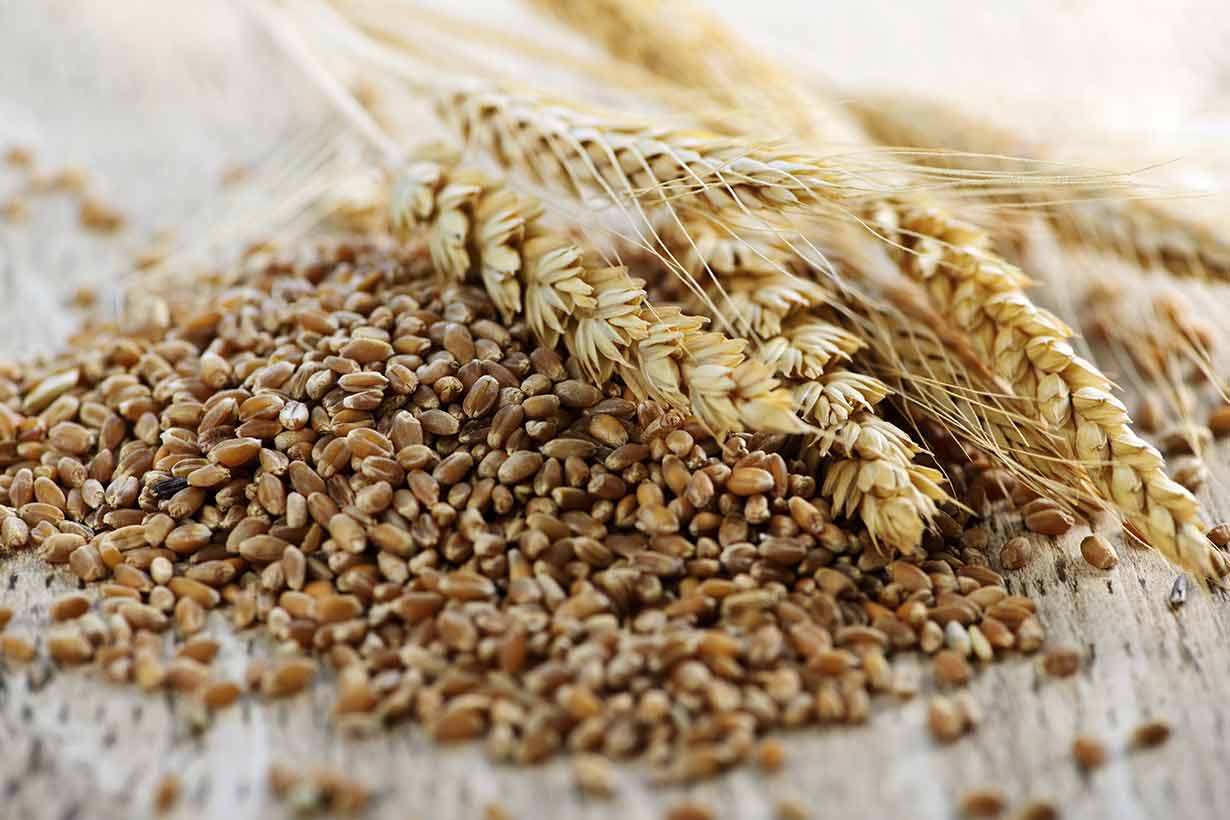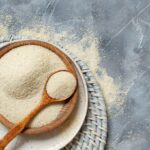Muesli is one of the most popular food types for breakfast.
However, is muesli a healthy choice?
This article looks at muesli’s nutritional properties and potential benefits and downsides.
Table of contents
- What Is Muesli?
- What Nutritional Values Does Muesli Provide?
- Some Muesli Contains Added Sugars
- Muesli Provides a Moderate Protein Source
- Muesli Is High In Fiber
- May Lower Diabetes Risk
- May Lower LDL Cholesterol Levels
- Muesli is a Healthier Choice Than Most Packaged Cereals
- It Is Easy To Make Homemade Muesli
- Does Muesli Have Any Potential Downsides?
- Further Questions
- Final Thoughts
What Is Muesli?
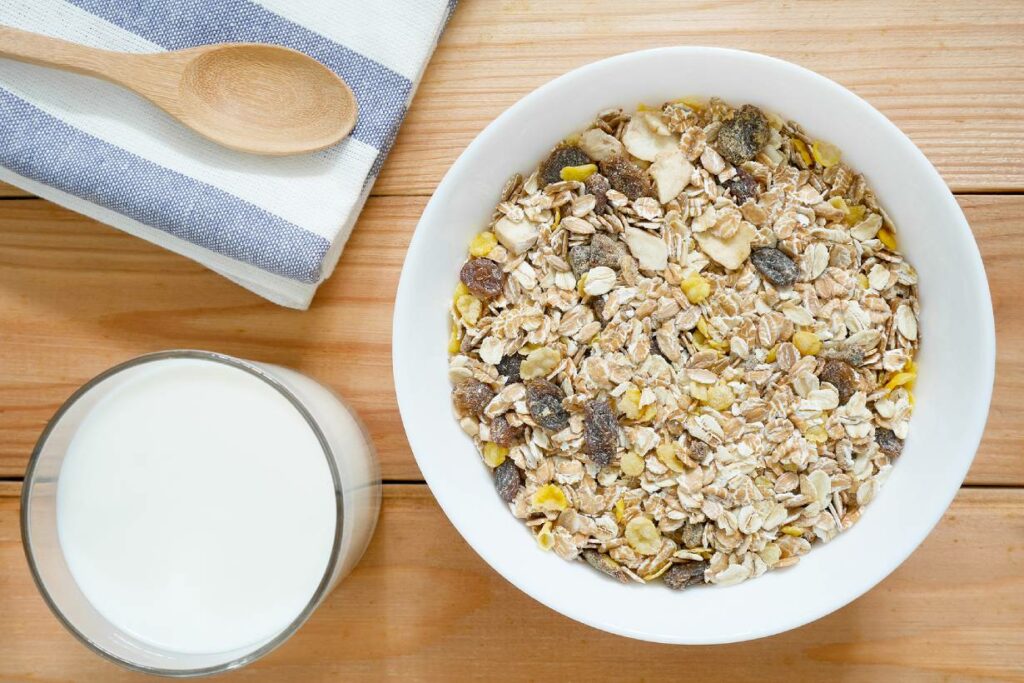
Muesli is a popular breakfast dish that first originated in Switzerland in 1900.
Initially, it was designed by a doctor as a meal for hospital patients under his care. The doctor is known as ‘the inventor of muesli’ and was called Maximilian Bircher-Benner (1).
The ingredients in muesli can vary but typically revolve around toasted oats, nuts, seeds, and dried fruits.
Grains represent the most significant proportion of ingredients in muesli, with nuts, seeds, and dried fruit added in relatively small proportions.
Typical Ingredients
Based on an ingredients listing logged in the USDA’s FoodData Central database, here are the typical ingredients of a no-added-sugar muesli product (Alpen brand) (2):
- Whole grain oats
- Whole grain wheat
- Raisins (coated with expeller pressed sunflower oil)
- Almonds
- Hazelnuts
As we can see, this particular muesli product contains only several ingredients, and the ingredients are minimally processed.
However, it is worth remembering that a muesli product’s nutritional quality (and ingredient profile) will vary. We will examine this in more detail slightly later in the article.
What Nutritional Values Does Muesli Provide?
The USDA FoodData Central database only has a complete nutrition profile for regular Alpen muesli. However, here are the nutritional values per 2/3 cup (55-gram) serving (3).
Daily values have been calculated using USDA data alongside the FDA’s recommended daily values (% DV) (3, 4).
| Name | Amount | % Daily Value |
|---|---|---|
| Calories | 194 kcal | |
| Carbohydrates | 41.6 g | 15.1% DV |
| Fiber | 5.0 g | 17.9% DV |
| Sugars | 11.0 g | |
| Fat | 1.82 g | 2.3% DV |
| Saturated | 0.27 g | 1.4% DV |
| Monounsaturated | 0.73 g | |
| Polyunsaturated | 0.51 g | |
| Omega-3 | 0.02 g | |
| Omega-6 | 0.48 g | |
| Protein | 6.16 g | 12.3% DV |
NB: the sugar content of ‘regular’ (added sugar) Alpen muesli is 11 grams per 55-gram serving. However, the no-added-sugar muesli product would provide 5.5 grams (2).
Vitamins
| Vitamin | Amount | % Daily Value |
|---|---|---|
| Choline | 16.9 mg | 3.1% DV |
| Folate, DFE | 16.5 mcg | 4.1% DV |
| Vitamin B1 (thiamin) | 0.22 mg | 18.3% DV |
| Vitamin B2 (riboflavin) | 0.22 mg | 16.9% DV |
| Vitamin B3 (niacin) | 1.17 mg | 7.3% DV |
| Vitamin B6 (pyridoxine) | 0.154 mg | 9.6% DV |
| Vitamin C | 4.78 mg | 5.3% DV |
| Vitamin E | 0.281 mg | 1.9% DV |
| Vitamin K | 1.38 mcg | 1.2% DV |
A typical muesli product provides a good source of B vitamins.
Minerals
| Vitamin | Amount | % Daily Value |
|---|---|---|
| Calcium | 80.8 mg | 6.2% DV |
| Copper | 0.165 mg | 18.3% DV |
| Iron | 1.65 mg | 9.2% DV |
| Magnesium | 51.7 mg | 12.3% DV |
| Phosphorus | 204 mg | 16.3% DV |
| Potassium | 230 mg | 4.9% DV |
| Selenium | 9.52 mcg | 17.3% DV |
| Sodium | 14.8 mg | 0.6% DV |
| Zinc | 1.65 mg | 15.0% DV |
Muesli typically offers good copper, magnesium, phosphorus, selenium, and zinc content.
Some Muesli Contains Added Sugars
When considering whether or not muesli is a healthy choice, one important consideration is the use of added sugars.
Whereas some products contain zero added sugar, some contain moderate amounts.
For instance, regular Alpen muesli has a sugar content of 20 grams per 100 grams (3). In contrast, no-added-sugar Alpen muesli only contains 10 grams of sugar per 100 grams. This is from the natural sugars in the muesli’s ingredients rather than added (2).
These data show that ‘regular’ muesli branded products contain approximately double the sugar content of no-added-sugar varieties.
Systematic reviews have demonstrated that a greater intake of added sugars is associated with weight gain and poorer diet quality (5, 6).
The recommended daily value for added sugars based on a 2000-calorie diet is no more than 50 grams daily (4).
Muesli Provides a Moderate Protein Source
While not quite a ‘high protein’ food, muesli provides moderate protein. On a 100-gram basis, this protein content is 11.2 grams, which translates to 6.16 grams per 55-gram serving (3).
Combined with 300 ml of dairy or soy milk, this can become 15-20 grams of dietary protein.
Adding an egg or two or some slices of tofu could bring the protein content into the 30-40 grams bracket for those wishing to increase their protein intake further.
Muesli Is High In Fiber
The primary ingredients in muesli are whole grains, nuts, seeds, and dried fruits, all of which contain fiber.
As a result, muesli tends to provide high amounts of dietary fiber.
Per 100 grams, Alpen muesli provides 9.1 grams of fiber, which is 5 grams per 55-gram serving (3).
The daily value for fiber is currently set at 28 grams per day, based on a 2000-calorie diet (4).
May Lower Diabetes Risk
Some research suggests that muesli may potentially lower diabetes risk, at least compared to some other breakfast dishes.
For example, a 2018 cohort study followed 58,000 women for an average of 12 years follow-up. Among the various cereals people consumed, only muesli (and the wider oat-based cereal category) were protective against diabetes development.
The study found that regular muesli consumption was associated with 26% lower odds of developing diabetes (7).
Additionally, an earlier study examined the effect of muesli on carbohydrate metabolism in patients with type 2 diabetes (8).
This study found that compared to cornflakes, consuming muesli at breakfast lowered the participants’ insulin requirements (-17%) and blood glucose levels (-21%).
May Lower LDL Cholesterol Levels
High levels of low-density lipoprotein cholesterol (more commonly known as LDL-C) are a risk factor for atherosclerotic cardiovascular disease (9, 10).
However, our habitual diet can significantly influence LDL-C levels (11).
On this note, a type of soluble fiber called beta-glucan has been demonstrated to significantly lower LDL-C levels (12). The richest food source of beta-glucans is oats, thus oat-containing foods like muesli.
A recent systematic review of randomized controlled trials showed that whole oats and beta-glucan supplements reliably lower LDL-C (13).
Muesli is a Healthier Choice Than Most Packaged Cereals
Context is always important when we consider how healthy a particular food is.
This context includes the comparison “compared to what?”
For instance, compare a bowl of muesli to a bowl of Greek yogurt containing fresh fruit, and you could make nutritional arguments for either choice.
However, muesli is a cereal product, and many boxed cereal products are ultra-processed and contain added sugars, refined carbohydrates, and oils.
To illustrate this point, the top three selling cereal products of 2021 in the United States were as follows (14):
- Cheerios
- Frosted Flakes
- Honey Nut Cheerios
The ingredients in each of these cereal products are further away from their whole food form than the ingredients in muesli. Additionally, these cereals contain lower levels of fiber and protein while providing more added sugars and higher levels of refined carbohydrates.
For example, the table below compares the ingredients of a no-added-sugar muesli product to these top-selling cereals (2, 15, 16, 17):
| No-added-sugar Muesli | Cheerios | Frosted Flakes | Honey Nut Cheerios |
|---|---|---|---|
| Whole grain oats, whole grain wheat, raisins (coated with sunflower oil), almonds, hazelnuts | Whole grain oats, corn starch, sugar, salt, tripotassium phosphate, vitamin E, calcium carbonate, iron and zinc, vitamin C, B vitamins, Vitamin A, Vitamin D3 | Milled corn, sugar, salt, malt extract, corn syrup, wheat starch, vitamin B1, vitamin B2, niacin, vitamin B6, folic acid, vitamin B12, vitamin A, vitamin C, vitamin D, reduced iron | Whole grain oats, sugar, oat bran, corn starch, honey, brown sugar syrup, salt, tripotassium phosphate, canola oil, almond flavor, vitamin E, calcium carbonate, zinc, iron, vitamin C, niacin, vitamin B6, vitamin B2, vitamin B1, vitamin A, folic acid, vitamin B12, vitamin D3 |
As we can see, muesli is more minimally processed and contains ingredients closer to their whole food form.
However, most muesli isn’t fortified….
On the other hand, it is worth noting that many boxed breakfast cereals are fortified with specific vitamins and minerals, whereas muesli is not.
Concerning this point, the ingredients in muesli are rich sources of vitamins and minerals themselves. However, fortified cereals are fortified with some nutrients that muesli doesn’t provide, such as vitamin D.
For those who already obtain sufficient vitamin D from sunlight, diet, and supplements, this is a non-issue. However, it is something worth being aware of, as fortified foods significantly contribute to vitamin D intake for some people.
It Is Easy To Make Homemade Muesli
Another consideration about the health properties of muesli is that it’s simple to make a homemade version. Also, this allows complete control over the ingredients in the product.
Raw Muesli
Making raw muesli is simple and involves mixing various ingredients together and storing them in an airtight large mason jar (disclosure: affiliate link).
A homemade muesli product could include ingredients such as the examples below:
- Almonds
- Barley flakes
- Cashew nuts
- Dried apricot
- Dried blueberries
- Dried coconut
- Dried cranberries
- Dried pineapple
- Hazelnuts
- Oat flakes
- Pecans
- Pumpkin seeds
- Raisins
- Rolled oats
- Salt (optional – just a touch)
- Sunflower seeds
- Walnuts
- Wheat germ
- Whole wheat flakes
Generally speaking, the grain proportion of muesli is typically somewhere between 60 to 90%, with 10 to 40% of the product being nuts, seeds, and dried fruit.
The ideal ratio will depend on personal preference.
‘Toasted’ Muesli
For those who prefer crunchier muesli, this involves briefly toasting the grains, nuts, and seeds.
Heat the oven to 200°C (392°F) to make toasted muesli. When the oven reaches the desired temperature, spread the grains, nuts, and seeds on a sheet pan and place them in the center of the oven.
Cooking for 6-10 minutes will be about right, depending on the desired texture. A longer time means a slightly crunchier texture.
Does Muesli Have Any Potential Downsides?
As with all foods, muesli does have some potential downsides that are context-specific and depend on the individual.
May Contain Allergens
The main potential drawback of muesli is for people with allergies or sensitivities to common ingredients like tree nuts and wheat.
For example, in a 2009 case study, a patient presented at hospital with a heart attack following a severe allergic reaction to a muesli product (18). A pine nut allergy was determined as the cause of the reaction.
Anyone with allergies should check the ingredients label and product packaging to ensure a specific muesli is suitable for them.
Gluten Intolerance
Although muesli is usually based on oats, some products contain wheat, making them unsuitable for people with gluten intolerance.
Once again, checking the ingredients label is essential for anyone with food sensitivities.
Further Questions
For additional information, here are some answers to some commonly asked questions.
Muesli typically contains lower levels of sugar than most boxed cereals. However, choosing a ‘no-added-sugar’ product will ensure the lowest sugar content.
Weight loss is determined by the total amount of food consumed (energy intake) compared to daily energy expenditure. Therefore, as part of an overall dietary pattern where energy intake is lower than expenditure, muesli could help someone lose weight. It is also possible that replacing highly processed cereal with muesli could indirectly encourage weight loss. On this note, a 2015 study found that oats suppressed appetite, increased satiety (the feeling of fullness), and lowered subsequent energy intake compared to a ‘ready-to-eat’ breakfast cereal (19).
The healthiest muesli could be a bought product, or it could be a homemade version. If purchasing a pre-made muesli product, looking for a no-added-sugar variety is likely a healthier choice.
Final Thoughts
Is muesli a healthy choice?
As previously stated, the answer depends on what we are comparing it to as well as the individual.
However, minimally processed muesli products tend to be an excellent source of fiber and a moderate protein source. They also contain healthier ingredients than most boxed cereals, such as whole grains, nuts, seeds, and dried fruits.
All in all, muesli is among the healthiest ‘cereal’ choices for breakfast.

